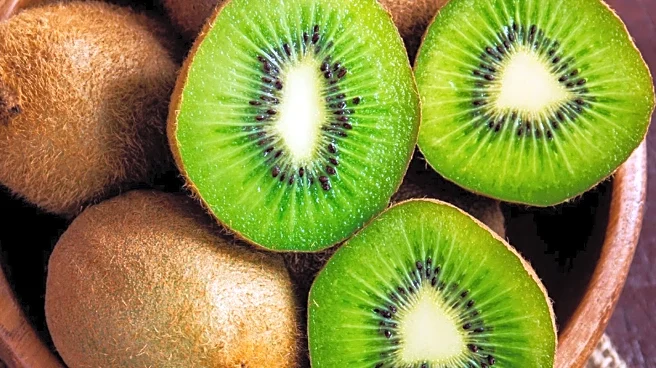What's Happening?
Recent guidelines from the British Dietetic Association have introduced new dietary recommendations for managing chronic constipation. The guidelines suggest consuming kiwifruit daily, as it has been shown
to effectively alleviate constipation symptoms. The fiber in kiwifruit, particularly when consumed with the skin, helps bulk up stools, facilitating their passage through the gut. Additionally, the enzyme actinidin in green kiwifruit aids in protein digestion, further easing constipation. The guidelines also highlight the benefits of mineral water and magnesium supplements, which can act as laxatives. Rye bread is recommended over white bread or common laxatives, with studies indicating its superior effectiveness in relieving constipation. However, the guidelines challenge the traditional emphasis on high-fiber diets, noting a lack of strong evidence supporting their effectiveness for constipation relief.
Why It's Important?
These new dietary guidelines could significantly impact how chronic constipation is managed, offering more personalized and evidence-based advice. The recommendations may lead to a shift away from generic high-fiber diets, which have been a staple in national dietary guidelines, such as those in the United States. This could affect dietary planning and public health strategies, as well as influence consumer choices and the food industry. Individuals with chronic constipation may benefit from these tailored recommendations, potentially improving their quality of life. However, the guidelines also caution against the use of magnesium supplements for individuals with kidney disease or those on certain medications, highlighting the need for professional medical advice.
What's Next?
The adoption of these guidelines may prompt further research into personalized dietary interventions for constipation and other digestive issues. Healthcare providers might begin to incorporate these recommendations into patient care, potentially leading to changes in dietary advice and treatment plans. The food industry could respond by promoting products like kiwifruit and rye bread as effective solutions for constipation. Additionally, there may be increased scrutiny and evaluation of existing dietary guidelines, particularly those emphasizing high-fiber diets, to ensure they align with the latest evidence-based research.
Beyond the Headlines
The shift away from high-fiber diets for constipation relief could have broader implications for dietary guidelines and public health messaging. It may challenge long-standing beliefs about fiber's role in digestive health, prompting a reevaluation of its benefits and limitations. This development also underscores the importance of personalized medicine and dietary recommendations tailored to individual needs, which could lead to more effective and targeted health interventions.












